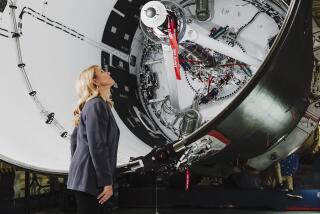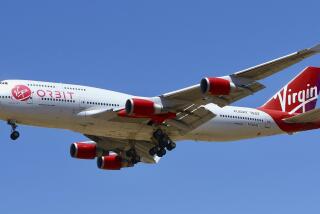Rockwell Considers Sale of Aerospace Lines
- Share via
Signaling that dramatic changes are continuing for the aerospace industry, Rockwell International Corp. is making overtures to sell most of its aerospace and defense lines, reportedly valued at $3.5 billion, sources familiar with the plans said Wednesday.
Long a pillar of the nation’s defense industry, Seal Beach-based Rockwell for decades has been churning out B-1 bombers, satellites and rocket engines for the government.
But the company’s effort to seek buyers for the aerospace and defense operations reflects its shift in recent years to its expanding commercial businesses, which include everything from semiconductor chips to auto transmissions to printing presses.
Still, the move marks a reversal for Rockwell and its chairman, Donald R. Beall, who has repeatedly defended the importance of aerospace to the company. Beall was unavailable Wednesday, and a company spokesman declined to comment.
However, senior industry sources said Beall began informal talks with prospective buyers of its aerospace group only after shopping, unsuccessfully, to buy other defense operations that might have enhanced Rockwell’s position in the market.
Sources said Rockwell’s talks with potential buyers were preliminary and that it is not in definitive negotiations with any one buyer. At this point, a source said, Rockwell is merely “seeing what people are willing to pay” for the group.
Rockwell’s contemplated spinoff of its aerospace group, first reported Wednesday in the Wall Street Journal, would exclude its Collins Avionics unit, a maker of electronics and instruments for aircraft. The Journal said Boeing Co. and McDonnell Douglas Corp. were among possible purchasers. Neither company would comment.
Word of Rockwell’s possible sale of assets sent its stock higher Wednesday in very heavy trading. The company’s price per share initially jumped 6%, then zigzagged throughout the day to close at $60, up $1.50 on the New York Stock Exchange.
Analysts were not surprised by Rockwell’s possible move, given that the company has steadily pared its reliance on aerospace contracts while increasing its role in fast-growing commercial markets.
But the prospect of a sale of a division that has been a stalwart of the region’s aerospace might rippled across the Southland.
Although its work force has declined in recent years, Rockwell still employs 11,500 people who work in aerospace and defense operations from Canoga Park to Anaheim. And several workers as well as union officials interviewed were anxiously seeking more information.
“We haven’t heard a thing,” said Al Bernal Jr., an employee at Rockwell’s Rocketdyne plant in Canoga Park, which makes the main engines for the space shuttle as well as for the Atlas and Delta rockets.
Added Frank Souza, a Paramount-based United Auto Workers union official whose local represents about 2,000 Rockwell workers: “I just drove back from Rockwell’s corporate headquarters, and either those people are real good actors or they knew nothing about what’s being talked about.”
Besides Canoga Park, Rockwell has facilities in its space operations in Downey and Palmdale, and it builds missiles and defense electronics in Anaheim. It also has a facility near Simi Valley to test rockets.
Like other defense contractors, Rockwell’s aerospace and defense division has been contending with shrinking Pentagon budgets in the post-Cold War era.
Its aerospace group--born in the 1967 merger of Pittsburgh-based industrial manufacturer Rockwell-Standard Corp. and aircraft builder North American Aviation Inc. in El Segundo--accounted for just 28% of Rockwell’s total annual revenue of $13 billion in its last fiscal year, compared with a 61% share in 1985.
Yet Rockwell has been publicly annoyed that Wall Street and others have not fully grasped how the company has successfully replaced sales lost from the completion of the B-1 and other aerospace programs with new commercial sales--and maintained steady profit growth.
Lately, Rockwell has pushed harder to change old perceptions of the company. Beall, in an introduction of the company in its home page on the Internet, begins, “Many of you may still think of us as a defense/aerospace firm, but a lot has changed in the last 10 years.”
Earlier this year, Beall said publicly that he saw Rockwell at the end of the decade as a company “even more focused on commercial electronics.”
Rockwell has acquired companies to expand its commercial group. Last year, for instance, it paid $1.6 billion for Reliance Electric Co., a maker of motors and controls that augmented its industrial-automation business.
Marco Antonio Caceres, an analyst with the aerospace research firm Teal Group in Fairfax, Va., said Rockwell might be willing to shed its aerospace business in part because the division has not won lucrative, long-term contracts recently for some of its basic products.
He noted, for instance, that Rockwell is not building any new space shuttles or shuttle main engines, although it continues to perform upgrade and modification work on them.
Boeing, however, “is trying to become more active in space and is working on becoming a launch provider,” Caceres said. “Rockwell’s manufacturing capabilities might come in handy.”
Boeing and McDonnell also are competing against Rockwell to develop a prototype for an advanced reusable launch vehicle--dubbed the X-33 program--that might someday replace the shuttle fleet.
McDonnell might also be interested in Rockwell’s assets because McDonnell’s primary space group is in Huntington Beach--where its Delta rocket launcher is built--and is therefore relatively close to Rockwell’s Rocketdyne subsidiary, which builds engines for the Delta.
Analysts also noted that defense electronics has become one of the industry’s most appealing markets, partly because the Pentagon is using its smaller resources to buy more electronics that enhance its existing weapons and troops. And Rockwell has a thriving defense electronics unit, with annual sales approaching $1 billion.
Boeing and McDonnell may feel the need to buy defense electronics assets more acutely than ever: Rival Northrop Grumman Corp. recently bought the defense electronics line of Westinghouse Electric Corp., and Lockheed Martin Corp. is about to purchase Loral Corp.’s defense group.
Times staff writers James F. Peltz in Los Angeles, Barry Stavro in the San Fernando Valley and Mack Reed in Ventura contributed to this report.
* PRAISE FOR CHAIRMAN
Colleagues credit Beall with overhaul of company. D2
* NOT COMPLETELY UNEXPECTED
Move out of defense is dramatic but not surprising. D2
(BEGIN TEXT OF INFOBOX / INFOGRAPHIC)
Good for the Stock
Reports that Rockwell International may be seeking to shed its aerospace and defense lines sent its stock price higher. Rockwell shares closed at $60, up $1.50, after trading as high as $63. Quarterly closes and latest:
Wednesday: $60
Source: TradeLine
More to Read
Inside the business of entertainment
The Wide Shot brings you news, analysis and insights on everything from streaming wars to production — and what it all means for the future.
You may occasionally receive promotional content from the Los Angeles Times.











